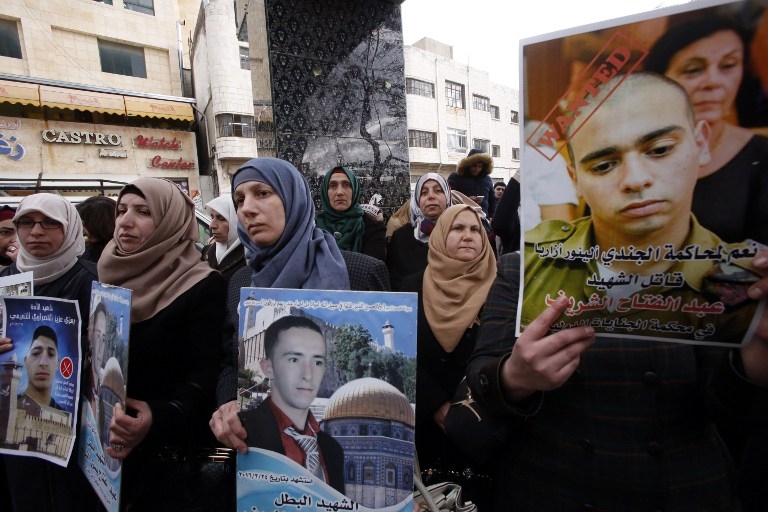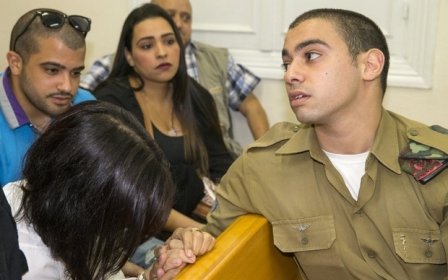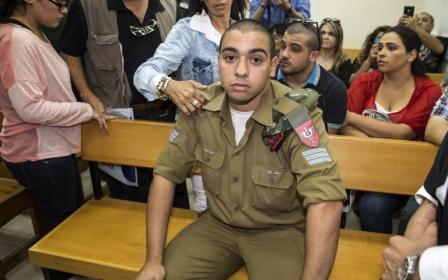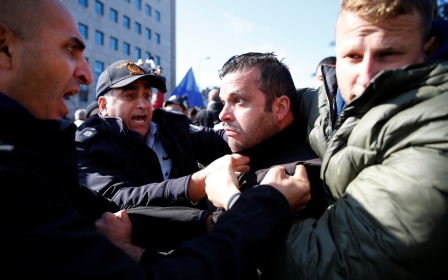Elor Azaria's trial was simply a tool to polish the occupation's image

On 24 March 2016, Israeli soldier Elor Azaria executed a 21-year-old Palestinian by the name of Abd Al-Fattah al-Sharif, who having been shot, was laying on the ground, not posing a danger to anyone in the Tel Rumeida neighbourhood of Hebron.
Unluckily for this soldier, cameras in the area captured what happened next, documenting al-Sharif’s killing minute by minute as army officers nearby simply walked around.
The Israeli media never mentioned Abd Al-Fattah Al-Sharif by name, referring to him only as the Palestinian or the terrorist
Given the footage, the army had no option but to initiate an enquiry that ended with Azaria’s indictment last April on charges of manslaughter.
Since then, a storm has raged within Israeli society between those who support his prosecution and those oppose it.
Yet there were no voices denouncing the execution or the murder itself. The debate was about the harm that could be inflicted upon the image of the state and the army had there been no indictment and prosecution.
On Wednesday, the military court in Jaffa found the soldier guilty of manslaughter.
'Shoot him in the head'
In the video clip that documents the execution, an Israeli ambulance driver, Ofer Ohana, can be heard shouting, “He is not dead; shoot him in the head.”
He then moves his ambulance so as to provide cover while the Israeli soldier points at Abd Al-Fattah’s head and shoots him dead.
The ambulance driver was not charged for his role in the execution. The military prosecutor was content with charging the soldier with manslaughter although all the evidence points to a fully fledged murder.
The Israeli media never mentioned martyr Abd Al-Fattah Al-Sharif by name, referring to him only as the Palestinian or the terrorist. There is hardly any mention of the condition of his family after his execution. The media simply regarded this to be a purely internal Israeli affair.
Crimes like this have happened inside the occupied territories hundreds of times during the past few years, but they usually occur in the dark without documentation or direct monitoring
Crimes like this have happened inside the occupied territories hundreds of times during the past few years, but they usually occur in the dark without documentation or direct monitoring, allowing the Israeli army to get away with doing nothing about these crimes.
This particular incident is reminiscent of the martyrdom of 18-year-old Tariq al-Natsheh in Hebron on 17 October 2015 who was seen climbing into an Israeli ambulance while not in bad shape at all.
Yet, he was pronounced dead upon his arrival at the hospital, thus confirming Palestinian suspicion that Israeli paramedics are involved in the executions.
It is also reminiscent of the execution of 18-year-old Hadil al-Hashlamoun, the young woman who was martyred on 22 September 2015 in exactly the same location when an Israeli soldier shot her 15 times. The ambulance was deliberately held back so as not to pick her up in time. It turned out afterwards that she actually never posed any danger to the soldier. The Israeli army never charged her executioner.
Caught on camera
In his trial, Azaria claimed that it was not fair to try him in court when none of the other soldiers who did exactly the same as he did were charged and while everyone has been saying that, had his action not been caught on camera, he might not have been prosecuted.
The statement made at the time by Israeli Defence Minister Moshe Yaalon about the need to investigate the killings augmented the tension with the Israeli prime minister forcing Yaalon to resign from his cabinet position on 20 May 2016. He was, in fact, heavily criticised for his stance and was accused of supporting "human rights".
The irony is that these same officials who are responsible for planning and implementing hundreds of murders, the same men who ordered the execution of so many Palestinians and carried out crimes against humanity, are now accused of supporting human rights
The chief of staff of the Israeli Army also came under similar attack and received the same kind of criticism for allowing the investigation to take place and allowing the soldier to be charged.
The irony is that these same officials who are responsible for planning and implementing hundreds of murders, the same men who ordered the execution of so many Palestinians and carried out crimes against humanity, are now accused of supporting human rights.
Their position in the Azaria case does not mean that they have turned into doves, nor will it wash away the crimes they themselves perpetrated.
Exception to the rule
The trial of soldier Azaria is the exception to the rule. Hundreds of crimes, executions and murders carried out by Israeli soldiers against the Palestinians have been disregarded and no investigation ever conducted into them.
In a report published by the Yish Din society in 2013, it is stated that 240 complaints were lodged against Israeli soldiers about crimes they perpetrated against the Palestinians. The military police investigated only 80 of them and no Israeli soldiers were ever charged as a result.
If anyone still has any doubts about the kind of democracy Israel is, this incident once again confirms that the only democracy here is one on paper
The same thing occurs every single year: hundreds of investigations rarely yield an indictment. This is the fig leaf used by the occupation as a cover to pretend in front of the rest of the world that nothing wrong is happening and that Israel is a state of law that punishes those who violate the law. International tribunals? Totally unnecessary, they want to show. And yet, on a daily basis, hundreds of crimes continue to be perpetrated against Palestinians.
In rare cases when Israeli soldiers who perpetrate crimes against Palestinians are charged, they usually get away with very light sentences. For example, a group of Israeli soldiers who filmed themselves while enjoying the beating and torture of a Palestinian prisoner, inflicting heavy physical and psychological damage on him, were released from prison in 2013 after less than four months.
In another case, an Israeli officer and an Israeli soldier executed 16-year-old Samir Awwad despite him posing no threat to them. At a recent hearing in November, a state prosecutor proposed that they two be sentenced to three months community service.
Pardoning murder
After the verdict was announced, the Israeli political leadership immediately announced their intention to pardon him – Netanyahu wrote it on his Facebook page - and preparations were set in motion to appeal to the president who has the final say on these matters.
Netanyahu wrote on his Facebook page that he supports granting a pardon to Azaria; in doing so the prime minister joined the rest of his ministers.
Even ministers who originally called for prosecuting Azaria, such as Shelly Yachimovich from the Zionist Union party, also supported the call for a pardon.
If anyone still has any doubts about the kind of democracy Israel is, this incident once again confirms that the only democracy here is one on paper. Those who think the Israeli military court will serve justice for Palestinians are dreaming.
This court where Azaria was tried - located in a series of buildings known as the Green House and once inhabited by a displaced Palestinian family - is nothing more than a tool, seeking to polish the image of the occupation while it merely continues to oppress.
Jihad Abu Raya is a Palestinian lawyer and activist based in northern Israel. He is a founder of the Falastenyat Movement.
The views expressed in this article belong to the author and do not necessarily reflect the editorial policy of Middle East Eye.
Photo: Abdul Fatah al-Sharif's mother, Rajaa, holds a poster of her son as Palestinians gather in the street in the West Bank town of Hebron on 4 January 2017 ahead of the verdict in the the trial of Israeli soldier Elor Azaria (AFP)
New MEE newsletter: Jerusalem Dispatch
Sign up to get the latest insights and analysis on Israel-Palestine, alongside Turkey Unpacked and other MEE newsletters
Middle East Eye delivers independent and unrivalled coverage and analysis of the Middle East, North Africa and beyond. To learn more about republishing this content and the associated fees, please fill out this form. More about MEE can be found here.





